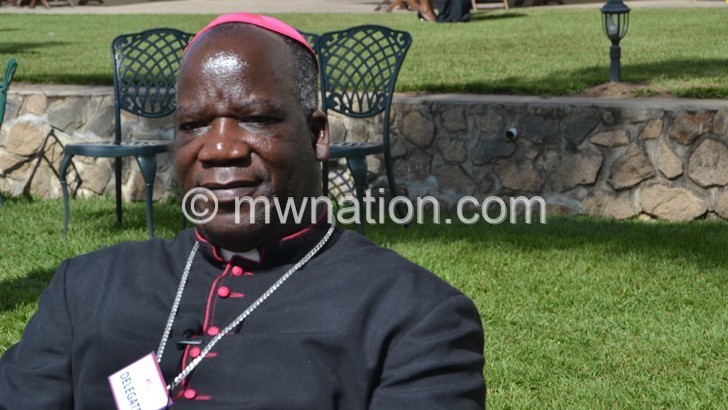Catholic bishops call for New Era
Catholic bishops in the country, under the umbrella of the Episcopal Conference of Malawi (ECM), have said Malawi needs a change of direction, lamenting that the hard-won democracy has not yielded fruits people anticipated.
The pastoral letter set to be read out in all Catholic churches today—the fifth Sunday of Easter in the Catholic calendar—observes that 54 years after independence, Malawians are still wallowing in poverty as the few “exercise power band enjoy wealth at the expense of the majority”.

In the preamble of their 16-page Pastoral Letter titled: ‘A Call For A New Era In Malawi’, the bishops say they are saddened to note that the hard-won freedom and democratic dispensation in the country have not brought hope to Malawians.
“We have observed with deep sorrow that the majority of the people in this country still languish under the yokes of poverty, ignorance, disease hunger a seriously distorted mindset that has led to a dangerous moral decadence in our society,” say the bishops in the Pastoral Letter, which is divided in three chapters.
Read full Pastoral Letter of the Episcopal Conference of Malawi 2018
In the first chapter titled ‘Need for a New Era in Malawi’, among other issues, the bishops say they are commissioned to preach the Gospel “whether it is convenient or inconvenient” (2 Timothy 4:2), noting that there is something wrong in our society that needs to be put right.
“We are of the opinion that Malawi, as a nation, needs a change of direction if we are to reverse the situation.
“We mean a total change in the way of doing things other than ‘business as usual,” the bishops say.
They go on to ask Malawians to take stock of whether the current system of government has over the years delivered on its promise to uplift the lives of all the citizens or whether the country paid lip-service to democracy by allowing a few people to exercise power and authority and enjoy the wealth of this country at the expense of the vast majority.
“We must never pretend that all is well,” the bishops advise.

They go on to remind Malawians that the period before multiparty democracy was a period of darkness and gloom as highlighted in their 1992 Pastoral Letter, Living Our Faith.
In the same chapter, the bishops underscore the importance of intra-party democracy, saying it is mainly through their chosen political parties that Malawians find full expression of their political rights as guaranteed by the Constitution.
“Regretfully, most if not all political parties in Malawi, have since 1993 failed to promote intra-party democracy,” say the bishops, further drawing Malawians’ attention to their 2008 Pastoral Letter titled Taking Responsibility for Our Future and Reading the Signs of the Times.
Among a list of examples of lack of intra-party democracy in the parties, the bishops say, key decisions are made by the party leader alone and sometimes only upon consultation with cronies, hangers-on or tribesmen.
They warn that the country cannot expect party leaders who stifle intra-party democracy to suddenly become democrats once they are in government.
But the bishops also warn that the success of entrenching democracy in the country largely depends on citizens’ understanding and participating in democracy.
Towards the end of the chapter the bishops warn about what they call ‘the big man syndrome’, which they say is seen in the extensive appointing powers of the president of party officials and tribesmen to government departments and agencies.
“This gives the impression that government only exists to benefit a connected few,” the bishops say, adding that clearly there are not enough checks and balances, and proper separation of powers among the three main branches of government.
They further advise the country’s leadership at all levels to revisit their constitutional mandate, which is to govern solely for the benefit of the people of Malawi, and to appreciate that they hold their positions on trust.
In the Second Chapter titled ‘Public Service Delivery’, the bishops lament poor delivery of health services, with special mention of major referral facilities. They also talk about “institutionalised corruption across the whole medical spectrum.”
They also lament deplorable standards in education, before talking about agriculture and food security, infrastructure, destruction of the environment.
The bishops say it is a fallacy to think that 54 years after independence, people’s standard of living has improved, “because the opposite is true”.
They conclude the letter with the chapter on ‘The Forthcoming Tripartite Elections in 2019’, whose first topic is about ‘Initiating a New Era’.
The bishops say citizens are duty-bound to elect and put into positions of power people they trust to implement their pre-election promises or those who have demonstrated that they delivered on their promises while in previous leadership positions.
They also provide a list of what they consider to be qualities of a good leader, which they say include honesty, transformational leadership, selflessness, willingness to step down, above tribal/regional political interests and God-fearing.
While advocating change of mindset, the bishops warn that corrupt leadership is “propped up and kept in power by citizens who unjustly and selfishly enjoy the benefits of that leadership.”
In conclusion, the bishops call on Malawians to help to create a new era in the country.
According to them, they want an era where truth, fairness and respect for the dignity of all are observed.
“This means wisely choosing servant leaders who can become heroic agents of change,”, adding that these will be the heroes not only for the deeds they do but for the stand they take on unpopular issues.
The bishops end their letter by urging all Catholics and people of good will to discuss their letter at all levels.
The Pastoral Letter issued today, has been signed by leaders of all the eight Catholic dioceses in the country, led by ECM bishop chairman Archbishop Thomas Luke Msusa of Blantyre.





